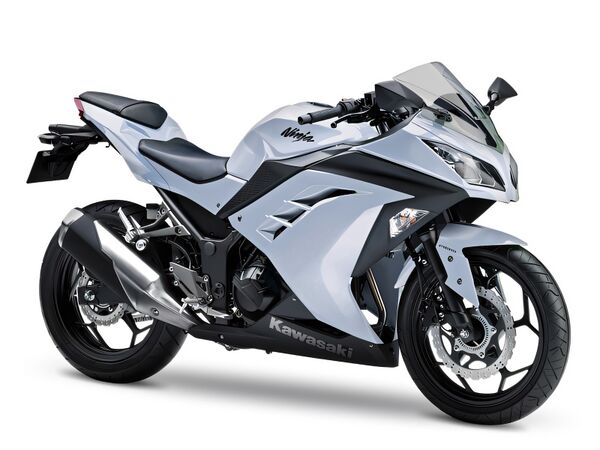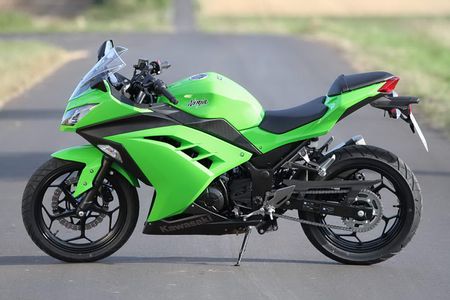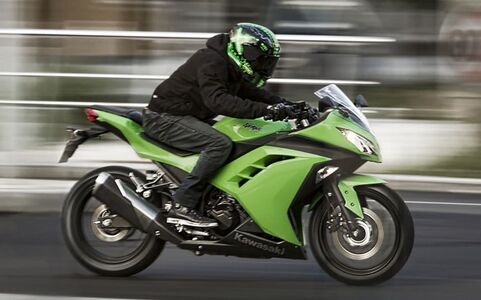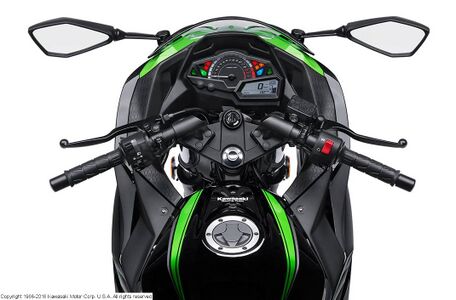Difference between revisions of "Kawasaki Ninja 300"
m |
m |
||
| (2 intermediate revisions by the same user not shown) | |||
| Line 1: | Line 1: | ||
| − | {{DISPLAYTITLE:Kawasaki Ninja 300}} | + | {{DISPLAYTITLE: Kawasaki Ninja 300}} |
| − | |||
{{#seo: | {{#seo: | ||
| − | |keywords= | + | |keywords={{PAGENAME}}, review, specs, owners manual, service manual, guide |
| + | |og:image=https://en.enduro.team/images/1/1b/BKKAWA_14EX300B_bianca.jpg | ||
}} | }} | ||
__notoc__ | __notoc__ | ||
| − | [[file:BKKAWA 14EX300B bianca.jpg| | + | [[file: BKKAWA 14EX300B bianca.jpg | 600px | center | Kawasaki Ninja 300]] |
| − | + | '''Kawasaki Ninja 300''' - budget sports motorcycle, appeared on the market in 2013, replacing the [[Kawasaki_Ninja_250R | Kawasaki Ninja 250R]] in Europe, North America, etc. By the way, the model [[Kawasaki_Ninja_250R | Ninja 250R]] was also updated for 2013 and was named [[Kawasaki_Ninja_250R | Ninja 250]], continuing to be sold in Japan and several other countries. Visually and almost completely on the technical side, the Ninja 250 and Ninja 300 models are identical and differ only in engines. | |
{{Ads_top}} | {{Ads_top}} | ||
| − | |||
| − | + | ''' Main competitors: ''' | |
| + | * [[Yamaha_R3_ (YZF-R3) | Yamaha YZF-R3]] | ||
| + | * [[Honda_CBR300R | Honda CBR 300]] | ||
| − | + | The Kawasaki Ninja 300 engine is a 2-cylinder, in-line, liquid-cooled 296 cc unit producing 39 hp. power and 27 Nm of torque. This motor was subsequently also installed on models such as [[Kawasaki_Z300 | Kawasaki Z300]] and [[Kawasaki_Versys_300 | Kawasaki Versys-X 300]]. | |
| − | + | On the chassis, the Kawasaki Ninja 300 is equipped with a steel frame, simple suspensions in the form of a conventional 37 mm telescopic fork and mono-shock absorber (adjustable for preload), disc 2-piston brakes (versions with ABS are available), a slipping clutch and a 6-speed gearbox. | |
| − | + | Unlike [[Kawasaki_Ninja_250R | Kawasaki Ninja 250R]], the Ninja 300 received a slightly reduced fuel tank (17.8 L -> 17.0 L) and an increased curb weight (169 kg -> 172 kg, ABS versions - 174 kg). | |
| − | |||
| − | |||
| − | == | + | 2017 was the last year of production of the Kawasaki Ninja 300, after which it rolled off the assembly line, giving way to the new version - the Kawasaki Ninja 400. In turn, [[Kawasaki_Ninja_250R | Kawasaki Ninja 250]] did not leave the market, but received a number of visual and technical updates - in particular, increased to 39 hp maximum engine power comparable to that of the Ninja 300. |
| − | + | ||
| − | + | == Photos == | |
| − | + | <gallery mode="packed" heights=200px> | |
| − | + | File:Kawasaki ninja 300 2013 - 03.jpg| | |
| − | + | File:Kawasaki Ninja-300 2383243k.jpg| | |
| − | + | File:73b15770-642b-402a-8391-eb9d866d2356.jpg| | |
| + | </gallery> | ||
{{Ads_feed}} | {{Ads_feed}} | ||
{{Ads_post}} | {{Ads_post}} | ||
| − | == | + | == Specifications == |
| − | + | Specifications Kawasaki Ninja 300: | |
| − | {| class="wikitable" | + | {| class = "wikitable" |
| − | ! scope="row"| | + | ! scope = "row" | Model |
| − | |Kawasaki Ninja 300 | + | | Kawasaki Ninja 300 |
|- | |- | ||
| − | ! scope="row"| | + | ! scope = "row" | Motorcycle type |
| − | | | + | | sport |
|- | |- | ||
| − | ! scope="row"| | + | ! scope = "row" | Release year |
| − | |2013-2017 | + | | 2013-2017 |
|- | |- | ||
| − | ! scope="row"| | + | ! scope = "row" | Frame |
| − | | | + | | steel diagonal |
|- | |- | ||
| − | ! scope="row"| | + | ! scope = "row" | Engine type |
| − | |2- | + | | 2-cylinder, 4-stroke, in-line |
|- | |- | ||
| − | ! scope="row"| | + | ! scope = "row" | Working volume |
| − | |296 | + | | 296 cm³ |
|- | |- | ||
| − | ! scope="row"| | + | ! scope = "row" | Bore / Stroke |
| − | |62 | + | | 62.0 x 49.0 mm |
|- | |- | ||
| − | ! scope="row"| | + | ! scope = "row" | Compression ratio |
| − | |10.6:1 | + | | 10.6: 1 |
|- | |- | ||
| − | ! scope="row"| | + | ! scope = "row" | Cooling |
| − | | | + | | liquid |
|- | |- | ||
| − | ! scope="row"| | + | ! scope = "row" | Number of valves per cylinder |
| − | |DOHC, 4 | + | | DOHC, 4 valves per cylinder |
|- | |- | ||
| − | ! scope="row"| | + | ! scope = "row" | Fuel supply system |
| − | | | + | | Injector with double throttles, 2x 32 mm |
|- | |- | ||
| − | ! scope="row"| | + | ! scope = "row" | Ignition type |
| − | | | + | | transistor |
|- | |- | ||
| − | ! scope="row"| | + | ! scope = "row" | Maximum power |
| − | |39 | + | | 39.0 h.p. (29.0 kW) at 11000 rpm |
|- | |- | ||
| − | ! scope="row"| | + | ! scope = "row" | Maximum torque |
| − | |27 | + | | 27.0 Nm (2.8 kg * m) at 10,000 rpm |
|- | |- | ||
| − | ! scope="row"| | + | ! scope = "row" | Gearbox |
| − | |6- | + | | 6-speed |
|- | |- | ||
| − | ! scope="row"| | + | ! scope = "row" | Drive type |
| − | | | + | | chain |
|- | |- | ||
| − | ! scope="row"| | + | ! scope = "row" | Front tire size |
| − | |110/70-17M/C (54S) | + | | 110 / 70-17M / C (54S) |
|- | |- | ||
| − | ! scope="row"| | + | ! scope = "row" | Rear tire size |
| − | |140/70-17M/C (66S) | + | | 140 / 70-17M / C (66S) |
|- | |- | ||
| − | ! scope="row"| | + | ! scope = "row" | Front brakes |
| − | |1 | + | | 1 disc, 290 mm, 2-piston caliper - (optional - ABS) |
|- | |- | ||
| − | ! scope="row"| | + | ! scope = "row" | Rear brakes |
| − | |1 | + | | 1 disc, 220 mm, 2-piston caliper - (optional - ABS) |
|- | |- | ||
| − | ! scope="row"| | + | ! scope = "row" | Front suspension |
| − | | | + | | 37mm Telescopic Fork (Fixed), 120mm Travel |
|- | |- | ||
| − | ! scope="row"| | + | ! scope = "row" | Rear suspension |
| − | | | + | | linkage Uni-Trak with monoshock (5-stage preload adjustment), 132 mm travel |
|- | |- | ||
| − | ! scope="row"| | + | ! scope = "row" | Motorcycle length |
| − | |2015 | + | | 2015 mm |
|- | |- | ||
| − | ! scope="row"| | + | ! scope = "row" | Motorcycle width |
| − | |715 | + | | 715 mm |
|- | |- | ||
| − | ! scope="row"| | + | ! scope = "row" | Motorcycle height |
| − | |1110 | + | | 1110 mm |
|- | |- | ||
| − | ! scope="row"| | + | ! scope = "row" | Wheelbase |
| − | |1405 | + | | 1405 mm |
|- | |- | ||
| − | ! scope="row"| | + | ! scope = "row" | Saddle height |
| − | |785 | + | | 785 mm |
|- | |- | ||
| − | ! scope="row"| | + | ! scope = "row" | Minimum ground clearance |
| − | |140 | + | | 140 mm |
|- | |- | ||
| − | ! scope="row"| | + | ! scope = "row" | Acceleration to 100 km / h |
| − | |6 | + | | 6.4 sec. |
|- | |- | ||
| − | ! scope="row"| | + | ! scope = "row" | Maximum speed |
| − | |170 | + | | 170 km / h |
|- | |- | ||
| − | ! scope="row"| | + | ! scope = "row" | Fuel tank capacity |
| − | |17 | + | | 17.0 l |
|- | |- | ||
| − | ! scope="row"| | + | ! scope = "row" | Motorcycle weight (curb) |
| − | |172 | + | | 172 kg - Ninja 300 |
| − | 174 | + | 174 kg - Ninja 300 ABS |
|- | |- | ||
|} | |} | ||
| − | == | + | == Fuel consumption == |
| − | + | The average fuel consumption of the Kawasaki Ninja 300, according to the test results, is 4.36 liters per 100 kilometers. The exact value depends on the riding style. | |
| − | |||
| − | |||
| − | |||
| − | |||
| − | |||
| − | |||
| − | |||
| − | == | + | == Documentation == |
| − | * [[Kawasaki_Ninja_300:_manuals|Kawasaki Ninja 300 | + | [[Category:Motorcycles]] |
| + | * [[Kawasaki_Ninja_300:_manuals|Kawasaki Ninja 300]] | ||
== == | == == | ||
{{Ads_recomended}} | {{Ads_recomended}} | ||
Latest revision as of 18:07, 12 July 2023
Kawasaki Ninja 300 - budget sports motorcycle, appeared on the market in 2013, replacing the Kawasaki Ninja 250R in Europe, North America, etc. By the way, the model Ninja 250R was also updated for 2013 and was named Ninja 250, continuing to be sold in Japan and several other countries. Visually and almost completely on the technical side, the Ninja 250 and Ninja 300 models are identical and differ only in engines.
Main competitors:
The Kawasaki Ninja 300 engine is a 2-cylinder, in-line, liquid-cooled 296 cc unit producing 39 hp. power and 27 Nm of torque. This motor was subsequently also installed on models such as Kawasaki Z300 and Kawasaki Versys-X 300.
On the chassis, the Kawasaki Ninja 300 is equipped with a steel frame, simple suspensions in the form of a conventional 37 mm telescopic fork and mono-shock absorber (adjustable for preload), disc 2-piston brakes (versions with ABS are available), a slipping clutch and a 6-speed gearbox.
Unlike Kawasaki Ninja 250R, the Ninja 300 received a slightly reduced fuel tank (17.8 L -> 17.0 L) and an increased curb weight (169 kg -> 172 kg, ABS versions - 174 kg).
2017 was the last year of production of the Kawasaki Ninja 300, after which it rolled off the assembly line, giving way to the new version - the Kawasaki Ninja 400. In turn, Kawasaki Ninja 250 did not leave the market, but received a number of visual and technical updates - in particular, increased to 39 hp maximum engine power comparable to that of the Ninja 300.
Photos
Specifications
Specifications Kawasaki Ninja 300:
| Model | Kawasaki Ninja 300 |
|---|---|
| Motorcycle type | sport |
| Release year | 2013-2017 |
| Frame | steel diagonal |
| Engine type | 2-cylinder, 4-stroke, in-line |
| Working volume | 296 cm³ |
| Bore / Stroke | 62.0 x 49.0 mm |
| Compression ratio | 10.6: 1 |
| Cooling | liquid |
| Number of valves per cylinder | DOHC, 4 valves per cylinder |
| Fuel supply system | Injector with double throttles, 2x 32 mm |
| Ignition type | transistor |
| Maximum power | 39.0 h.p. (29.0 kW) at 11000 rpm |
| Maximum torque | 27.0 Nm (2.8 kg * m) at 10,000 rpm |
| Gearbox | 6-speed |
| Drive type | chain |
| Front tire size | 110 / 70-17M / C (54S) |
| Rear tire size | 140 / 70-17M / C (66S) |
| Front brakes | 1 disc, 290 mm, 2-piston caliper - (optional - ABS) |
| Rear brakes | 1 disc, 220 mm, 2-piston caliper - (optional - ABS) |
| Front suspension | 37mm Telescopic Fork (Fixed), 120mm Travel |
| Rear suspension | linkage Uni-Trak with monoshock (5-stage preload adjustment), 132 mm travel |
| Motorcycle length | 2015 mm |
| Motorcycle width | 715 mm |
| Motorcycle height | 1110 mm |
| Wheelbase | 1405 mm |
| Saddle height | 785 mm |
| Minimum ground clearance | 140 mm |
| Acceleration to 100 km / h | 6.4 sec. |
| Maximum speed | 170 km / h |
| Fuel tank capacity | 17.0 l |
| Motorcycle weight (curb) | 172 kg - Ninja 300
174 kg - Ninja 300 ABS |
Fuel consumption
The average fuel consumption of the Kawasaki Ninja 300, according to the test results, is 4.36 liters per 100 kilometers. The exact value depends on the riding style.
Documentation



